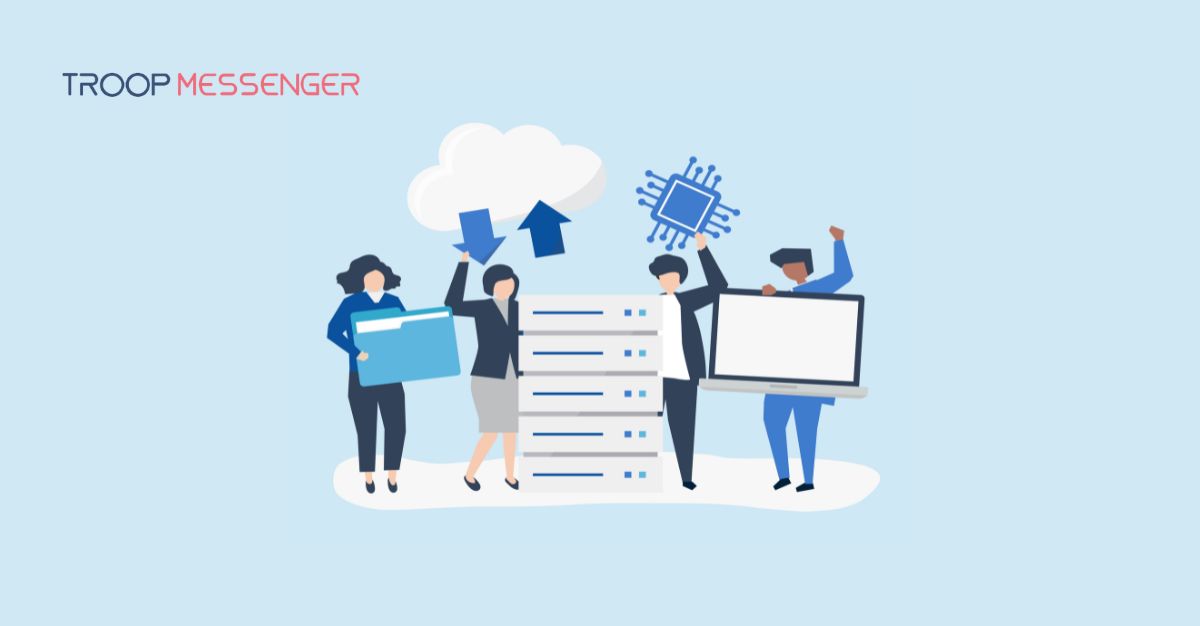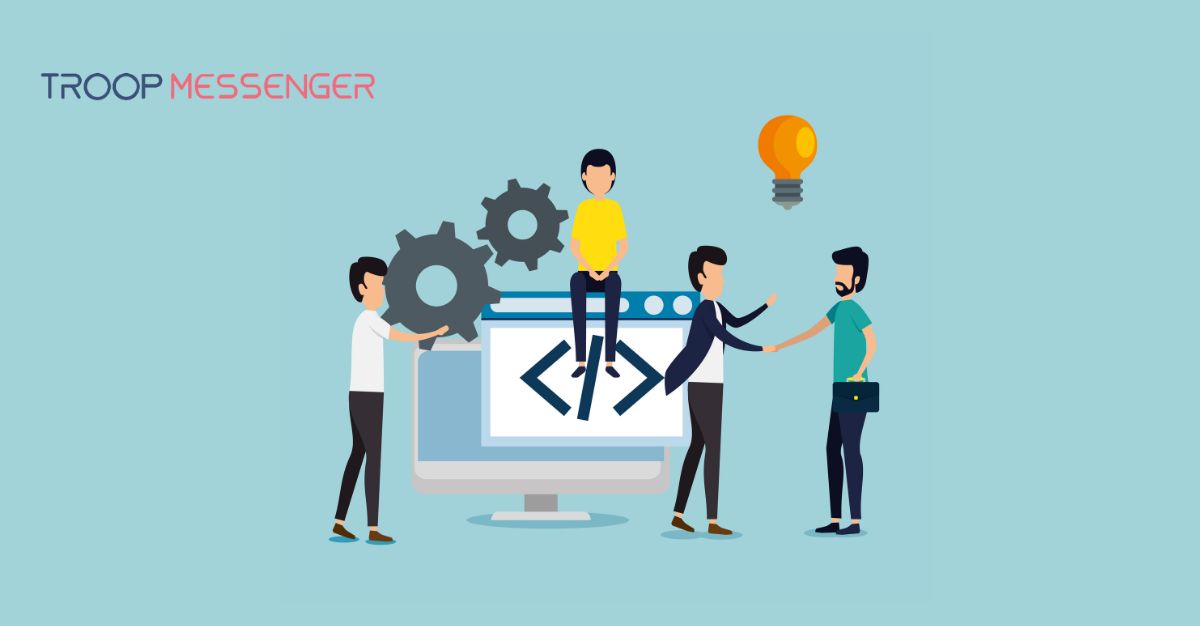Connect with us

How to Secure Communication When Working Remote?
Managing a remote team's communication requires a bit more effort than if everyone were in the same office. You need to be deliberate about creating a communication strategy, ensuring everyone is on the same page with the office chat app, and making sure everyone feels comfortable sharing information. There are a few key things you can do to make sure your remote team's communication is secure.
Table of Contents
- 1. Use a VPN
- 2. Use Two-Factor Authentication
- 3. Use a secure messaging app
- 4. Use a password manager
- 5. Use a secure email service
- 6. Use a secure file-sharing service
- 7. Use a secure online backup service
- 8. Use a secure browser
- 9. Use a secure FTP service
- 10. Use a secure remote desktop service
- 11. Use a secure website
- 12. Use a secure Wi-Fi network
- 13. Use a secure VoIP phone service
- 14. Use a secure instant messaging software
- 15. Use a secure online storage service
- 16. Use a secure file storage service
- 17. Use a secure online backup service
- Conclusion
1. Use a VPN
A VPN encrypts your internet connection and routes it through a server in another location, making it appear as if you are accessing the internet from that server's location. This can be useful for accessing geo-blocked content or bypassing restrictions placed on your internet connection by your employer. If you are working remotely, make sure to use a VPN to encrypt your internet connection and protect your data. For added security, consider having your remote team make use of a residential proxy.
2. Use Two-Factor Authentication
Two-factor authentication (2FA) adds an extra layer of security to your online accounts by requiring you to enter a second code after entering your username and password. This code is usually generated by an app on your phone and can help protect your account from hackers if your password is stolen. If you are working remotely, make sure to use 2FA on all of your online accounts.
3. Use a secure messaging app
Secure messaging apps, such as Troop Messenger, Signal, and WhatsApp, encrypt your messages so that only the intended recipient can read them. This is a good way to send sensitive information or for communicating with people who do not use your regular email address. Some messaging apps have come under fire over the last couple of years for not doing enough to protect and encrypt data, exposing their users to hacks and data theft.
4. Use a password manager
A password manager stores your passwords in an encrypted database, making it easy to create and manage complex passwords. This can help keep your online accounts secure even if one of your passwords is compromised. It is also a good idea to keep your passwords randomized. Password managers are great because they allow for more secure and quicker logins for your team members.
5. Use a secure email service
Secure email services, such as ProtonMail and Tutanota, encrypt your emails so that only the intended recipient can read them. They are helpful for sending sensitive information or for communicating with people who do not use your regular email address. On top of using a secure email service, it is also important to make sure all employee computers utilize firewalls and antivirus software that will scan incoming emails and provide warning messages when suspicious messages or links are encountered.
6. Use a secure file-sharing service
Secure file-sharing services, such as Sync and SpiderOak, encrypt your files so that only the intended recipient can read them. These are an important part of sharing sensitive information or collaborating on projects with people who do not have access to your regular file storage system.
7. Use a secure online backup service
Secure online backup services, such as Backblaze and Carbonite, encrypt your files so that only the intended recipient can read them. You need things like these to back up your files or for sharing sensitive information with people who do not have access to your regular backup system.
8. Use a secure browser
Secure browsers, such as Google Chrome and Mozilla Firefox, help protect you from online threats by warning- ing you about malicious websites and blocking dangerous content. It is always important for remote teams to be extremely careful when it comes to opening emails and visiting potentially dangerous websites. Employee education is key in keeping your business secure while working remotely, given that your employees represent your biggest cybersecurity threat. This threat is only going to increase in the future with more and more businesses turning to the remote work model.
9. Use a secure FTP service
Secure FTP services, such as FileZilla and Cyberduck, encrypt your connection to the server so that only the intended recipient can read the data. This can be useful for transferring sensitive information or for accessing servers that are located in remote locations.
10. Use a secure remote desktop service
Secure remote desktop services, such as Splashtop and TeamViewer, encrypt your connection to the remote computer so that only the intended recipient can read the data. These provide invaluable peace of mind when accessing your work computer from home or for providing technical support to someone who is not physically present.
11. Use a secure website
Secure websites, such as those that use HTTPS, encrypt your connection to the server so that only the intended recipient can read the data. You absolutely need these for accessing sensitive information or for conducting transactions on sites that do not use SSL/TLS encryption.
12. Use a secure Wi-Fi network
Secure Wi-Fi networks, such as those that use WPA2 encryption, encrypt your connection to the router so that only the intended recipient can read the data. These are used to prevent other people from accessing your network or for protecting your information when you are using an unsecured Wi-Fi network.
13. Use a secure VoIP phone service
Secure VoIP phone services, such as Skype and Google Hangouts, encrypt your voice conversations so that only the intended recipient can listen to them. VoIP is increasingly common and very useful when it comes to customer service while also securing your privacy and communicating with people who are located in different countries.
14. Use a secure instant messaging software
Secure instant messaging software, such as WhatsApp and Signal, encrypt your messages so that only the intended recipient can read them. This end-to-end encryption is vital for keeping your conversations private and for communicating with people who are not physically present.
15. Use a secure online storage service
Secure online storage services, such as DropBox and Google Drive encrypt your files so that only the intended recipient can read them. This is a great way to store sensitive information or to collaborate on projects with people, particularly external workers, who do not have access to your regular file storage system.
16. Use a secure file storage service
Secure file storage services, such as iCloud Drive and DropBox, encrypt your files so that only the intended recipient can read them. Having something like this is incredibly important for securely sharing sensitive information or for collaborating on projects with people who do not have access to your regular file storage system.
17. Use a secure online backup service
Secure online backup services, such as Backblaze and Carbonite, encrypt your files so that only the intended recipient can read them. You need these for backing up your files or for sharing sensitive information with people who do not have access to your regular backup system.
Use a secure Wi-Fi network: Secure Wi-Fi networks are those that use WPA2 encryption, encrypting your connection to the router so that only the intended recipient can read the data. You need these for preventing other people from accessing your network or for protecting your information when you are using an unsecured Wi-Fi network.
Conclusion
The best way to keep your communication secure while working remotely is by using a combination of these methods. By using these practices, you can protect your data while communicating with people who are located in different countries or using networks and internet connections that are outside of your control.



.jpg)




